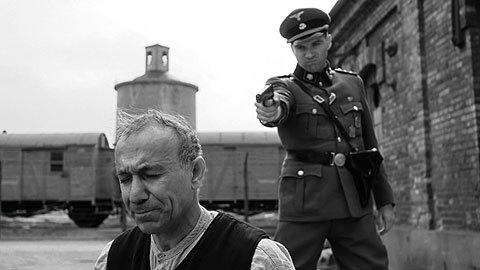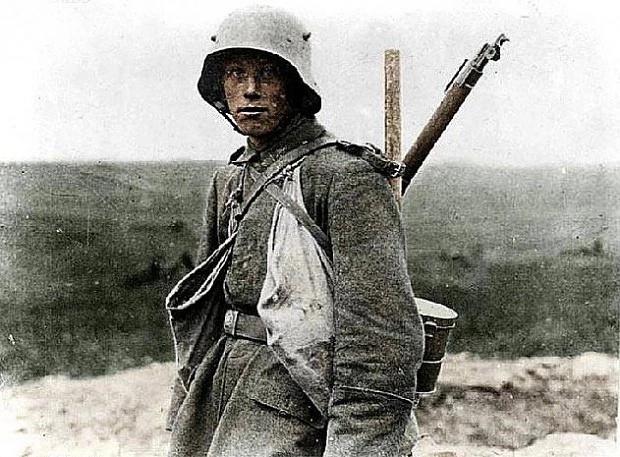
I have seen plenty of posts on here regarding this subject so I decided to make a series of articles about it and give you the chance of reading a somewhat different opinion for a change.
Below I'm giving you the first chapter of the book "The Myth of German Villainy" to begin with:
"As the result of losing two apocalyptic world wars, Germany has acquired a reputation as the evil nation of Europe, and, perhaps the evil nation of all time. Just mentioning the word “German” still brings forth an image in the mind’s eye of robotic, goose-stepping storm troopers, under the command of stiff-necked Prussian officers, ready to march off to inflict gratuitous murder and destruction upon their peace loving neighbours. We have been brainwashed by relentless propaganda to regard the Germans as intrinsically militaristic, aggressive, brutish, racist and anti-Semitic, with a predilection for blind obedience to authority figures. Hundreds of Hollywood movies, relentless Holocaust propaganda, and countless books and magazine articles have permanently reinforced this negative image of German in the popular mind. Rational motives for the inexplicable horrors Germans are accused of having routinely committed are not required. It is axiomatic that their evil nature explains it all.
Consider the movie, “Schindler’s List,” by the Jewish director, Stephen Spielberg, for example. The Nazi commandant of the concentration camp (supposedly the Plaszow camp outside of Krakow, not far from Auschwitz), is standing shirtless on the balcony of his house with a hunting rifle over his bare shoulders. The rifle is equipped with a telescopic sight. In the movie, the house is located on a hill above the camp so that he can look down on the throngs of prisoners milling around in the compound below. He lifts the rifle to his shoulder and through the telescope begins casually scanning from one prisoner to another. The image through the telescope now fills the movie screen. The crosshairs of the scope stop on a randomly selected prisoner. He pulls the trigger and the prisoner drops to the ground, dead.
The screen then cuts back to the Nazi commandant to show bored insouciance as he actuates the bolt of his rifle and casually raises it back to his shoulder. He fires again, and again a prisoner drops to the ground, dead. Bored with his “target practice,” he turns his attention to the beautiful, sexy, naked woman lying on a bed just inside the house from the balcony. The woman is purportedly one of his Jewish housemaids selected from the camp, who also apparently serves as his sex slave. His face expresses disdainful, though lackadaisical, cynicism. The point of the shootings, as well as bringing in the naked housemaid (who just happens to be a Jew, what else?), is to show the Nazi officer as totally depraved, without conscience, morality, or empathy for other humans; in short, a psychopath. It is presumed, of course, that the murdered prisoners were all Jews. Two popular Jewish themes are combined here: Nazi evil and Jewish persecution.

This episode is entirely fictional, based on a novel by Thomas Keneally, an Australian, who only visited the concentration camps once in 1980 and who had no real knowledge of what went on there. No such actual event as described above has ever been recorded, yet the vast majority of movie goers swallow it whole and accept it as actual history. The real Plaszow camp was located on the other side of a hill from the commandant’s house, and completely out of sight from the commandant’s balcony. It would have been impossible for him to shoot down into the compound as shown in the movie even if he had been inclined to do so, which is highly unlikely.
The actual commandant of Plaszow, Amon Goeth, on which the character in the movie was based, lived in the house with his fiancé Ruth Kalder, with whom he had a child. Ruth said that they intended to marry but were unable to do so due to the chaos at the end of the war. She had her name and the child’s name changed to Goeth after the war with the help of Amon Goeth’s father. Amon Goeth was hanged after the war by the Polish government (the post war Polish government was all Jewish, incidentally) primarily for being a member of the Nazi party and a member of the Waffen-SS, not for shooting prisoners. Ruth described Amon Goeth as a cultured man who had a beautiful singing voice. Goeth did, indeed, have two Jewish housemaids selected from the camp while he was commandant, but they were not beautiful and sexy as depicted in the movie, and there is no information that he had untoward relations with them. That story was only included to add spice to the movie.
Another example is the movie, “Sophie’s Choice,” by another Jewish director, Alan J. Pakula, in which “Sophie” and her two small children are sent to Auschwitz (Auschwitz is the holy temple of Holocaust lore). During the “selection” process (the “selection” is now one of the “stations of the cross” of the Holocaust religion) immediately after their arrival, Sophie is told by a stereotypically evil Nazi officer (supposedly Dr. Joseph Mengele of Auschwitz notoriety) that she can only keep one of her children and that the other must go to the gas chamber. She is forced to choose which one to keep and which one to be sent to the gas chamber, hence, “Sophie’s Choice.” The evil Nazi officer provides no reason or explanation in the movie for requiring one child to die or for forcing her to make this heart rending choice. That he is an “evil” Nazi is presumed to be explanation enough. This preposterous movie was based on a novel by the American Southern writer William Styron, who had no firsthand knowledge of the camps at all.

Auschwitz was simply used as the setting for a tale which came out of his imagination. Nothing of the sort ever happened in real life. Yet, evil Nazi stories such as these have long been a staple in Hollywood. The movie-going public has been so conditioned by this poppycock that fiction has become fact in the public mind. We have all been brainwashed to accept such absurdities without skepticism. Germans are “evil,” so they do “evil” things. No further explanation needed. Yet, Germany was not always seen in this light.
The image of Germany as a sinister, predatory, warlike nation only took root in the twentieth century. Nineteenth century Germany, by contrast, was seen as a place of peace and enlightenment. The English historian, Frederic William Maitland, described the way the English people saw the Germans during the nineteenth century: “… it was usual and plausible to paint the German as an unpractical, dreamy, sentimental being, looking out with mild blue eyes into a cloud of music and metaphysics and tobacco smoke.”
The highly influential French writer and Salon matron, Madame de Stael, portrayed the Germans during the period of the Napoleonic Wars as a nation of “poets and thinkers, a race of kindly, impractical, other-worldly dreamers without national prejudices and disinclined to war.” The Americans also held a benign opinion of the Germans prior to the twentieth century. The American historian, Henry Cord Meyer, wrote, “… whether seen in their newly united nation [Germany was united into one nation in 1871] or in this country [German immigrants in the United States], the Germans were generally regarded as methodical and energetic people who were models of progress, while in their devotion to music, education, science, and technology they aroused the admiration and emulation of Americans.”

The highly influential French writer and Salon matron, Madame de Stael, portrayed the Germans during the period of the Napoleonic Wars as a nation of “poets and thinkers, a race of kindly, impractical, other-worldly dreamers without national prejudices and disinclined to war.” The Americans also held a benign opinion of the Germans prior to the twentieth century. The American historian, Henry Cord Meyer, wrote, “… whether seen in their newly united nation [Germany was united into one nation in 1871] or in this country [German immigrants in the United States], the Germans were generally regarded as methodical and energetic people who were models of progress, while in their devotion to music, education, science, and technology they aroused the admiration and emulation of Americans.”
The German people have historically made great contributions in every sphere of cultural, intellectual, and scientific achievement. In the field of music, there were such eighteenth century geniuses as Bach, Hayden, Mozart, Beethoven, Shubert and Schuman, to name a few. This musical genius continued in the nineteenth century with the Strausses, Mahler and Richard Wagner. There were the literary contributions of Goethe and Schiller; the historical works of Ranke and Niebuhr; the philosophical studies of Kant and Hegel; and the great scientific contributions of Alexander von Humboldt and William Conrad Roentgen.
These are only a few examples of a very long list. The Prussian system of higher education and the cultural flowering which characterized Prussia during the years following the Napoleonic wars greatly influenced both Europe and America. The American public school system as well as the British university system was deliberately modeled after the Prussian public school system and university system.
Germany was admired by the world as a center of learning, for its high culture and for its achievements in every field; but also for its culture of honesty, hard work, orderliness and thrift, which existed even at the lowest level of society. British scholars and journalists had been very favorably disposed toward all things German, including their history, culture, and institutions throughout the nineteenth century.
British author Thomas Arnold (June 13, 1795 – June 12, 1842) saw Germany not as a nation with a unique predisposition toward authoritarianism and regimentation, but rather as a “cradle of law, virtue, and freedom,” and considered it a “distinction of the first rank” that the English belonged to the Germanic family of peoples.
Germany’s positive image changes over night.
This view of Germany was to change almost overnight with the outbreak of World War I. After the war began in 1914 a grotesque image of a rapacious, bloodthirsty and uniquely aggressive Germany quickly took form and became the stereotypical image of Germany in Europe and America. This new image of Germany was the direct result of a virulent anti-German propaganda campaign conducted by the British government and later joined by the United States government in which deliberate and systematic lies, distortions and false atrocity stories were disseminated to the British and American publics. The emotions of both the British and American publics were deliberately whipped up to a fever pitch of hatred for the “Hun.”
A pathological hostility towards all things German, which later became such a familiar and integral part of Western thinking about Germany, had its birth in this skillful propaganda campaign. After World War Two, Historian Harry Paxton Howard examined this transformation of Germany’s reputation which began immediately after the start of WWI. It was made out, he said, that Germany was not only evil but had always been that way, and that Germany, contrary to the facts, had always been the historical enemy of Europe and America.
He wrote:
“Actually, in the literal sense of the word, the biggest job of revising history was done during the First World War when our ‘histories’ were completely revised to show that Germany had always been our enemy, that Germany had started the war in 1914, that Germany had even started the Franco-Prussian War in 1870, and that in the Revolutionary War we had not been fighting the British but the Hessians — not to mention such things as the Germans cutting the hands off Belgian babies, instead of the Belgians cutting off the hands of Congolese. This was a real revision of our histories which has distorted the American mind for more than forty years.”

 Holidays
Holidays  Girl's Behavior
Girl's Behavior  Guy's Behavior
Guy's Behavior  Flirting
Flirting  Dating
Dating  Relationships
Relationships  Fashion & Beauty
Fashion & Beauty  Health & Fitness
Health & Fitness  Marriage & Weddings
Marriage & Weddings  Shopping & Gifts
Shopping & Gifts  Technology & Internet
Technology & Internet  Break Up & Divorce
Break Up & Divorce  Education & Career
Education & Career  Entertainment & Arts
Entertainment & Arts  Family & Friends
Family & Friends  Food & Beverage
Food & Beverage  Hobbies & Leisure
Hobbies & Leisure  Other
Other  Religion & Spirituality
Religion & Spirituality  Society & Politics
Society & Politics  Sports
Sports  Travel
Travel  Trending & News
Trending & News
Most Helpful Opinions